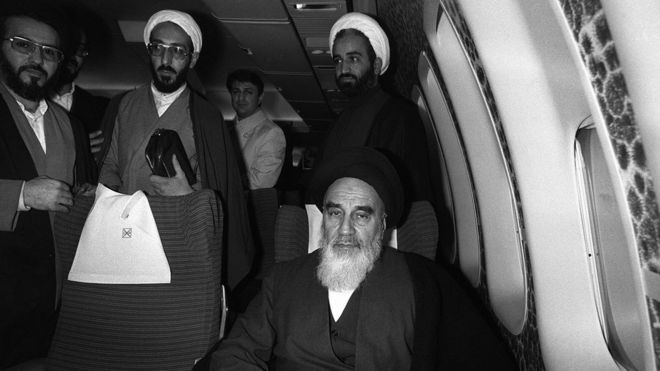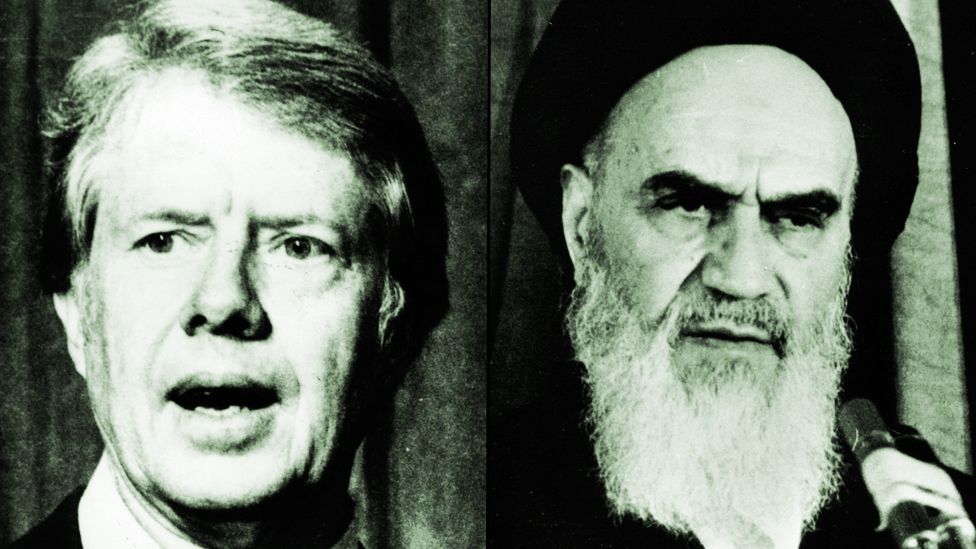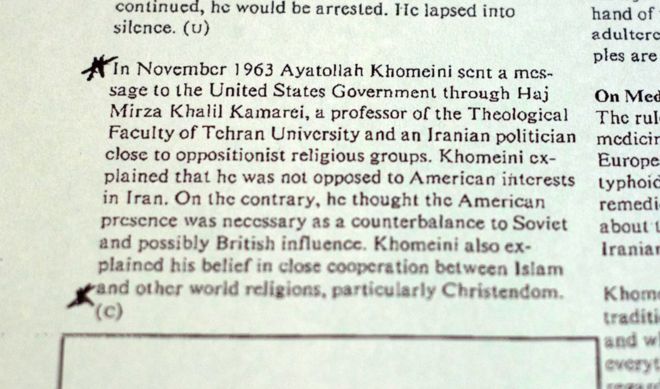Jimmy Carter? Inept, Naive, Foolish
"The best that can result, in my view, is a military coup against Bakhtiar and then a deal struck between the military and Khomeini that finally pushes the Shah out of power."
"Conceivably this deal could be struck without the military acting against [then-Iranian Prime Minister] Bakhtiar first."
Deputy National Security Adviser David Aaron, January 1979
 |
| Khomeini aboard the plane that brought him back to Tehran in triumph -- Getty Images |
Ayatollah Ruhollah Khomeini was preparing to come out of exile in Paris in 1979, and he planned to successfully execute an Islamist revolution, one that would in its wake, transform Islam itself as it was practised in the Middle East, particularly for Shiite Muslims. What he feared was the intervention of the United States, that hated military-industrial powerhouse that supported Reza Pahlavi, the Shah of Iran whom Khomeini was preparing to unseat.
 |
| On 27 January, 1979, Ayatollah Ruhollah Khomeini - founder of Iran's Islamic Republic, the man who called the United States "the Great Satan" - sent a secret message to Washington. -- Getty Images |
The Shah's Prime Minister Shapour Bakhtiar took steps to close the airport to disrupt Ayatollah Khomeini's plans to return to Tehran. And the U.S. administration saw the potential for a civil war, with the Imperial Guard divisions prepared to defend the Shah against Khomeini's faithful supporters by armed struggle and jihadist inspired martyrdom.
As far as the White House was concerned a civil war would impede American strategic interests in the region, and imperil the lives of thousands of U.S. military advisers, along with the security of American weapons systems such as F-14 jets in Iran, let alone interfere with the flow of oil, vital to American industry. The United States under various administrations has always been prepared to jettison its support of key foreign figures if it was felt required.
In this instance, it was the ailing Shah, who was advised that he would no longer have the backing and support of the United States. Khomeini had sent messages to then-President Jimmy Carter to assure him that his new regime, once established, would be amenable to working with the United States, that the flow of oil would continue. And Mr. Carter allowed himself to be conveniently convinced that it would be in the U.S. best interests to switch allegiances in Iran.

Khomeini was concerned that at the last moment, the United States would once again reinstate the Shah. He and those who interacted on his behalf who had credibility with the American administration, made every effort to convince President Carter that relations with Iran would remain sound under the Islamic Republic he was bringing in. And he asked that three things be done on his behalf; his return to Tehran be unopposed and even aided by the U.S.; that it convince the constitutional government it must resign in Khomeini's favour, and that the Imperial militias capitulate.
Ayatollah Khomeini intimated that should the Iranian military oppose him in continued support of the Shah, the ardent believers in Khomeini's Islamist promise would begin a violent protest targeting American citizens in Iran. A peaceful resolution of the crisis was entirely possible, he stressed, as long as the United States trusted him and surrendered the future of Iran to his capable hands.
 |
Ayatollah Ruhollah Khomeini (left) being greeted by his supporters in Tehrān, 1979.
AFP/Getty Images
|
President Carter's decision-making resulted in the historical installation of a fiercely aggressive Islamist administration for Iran -- one whose dedication to the pure version of Islam reflecting the 7th Century advent of a Bedouin-Arab-inspired religion borrowing tenets and philosophical principles heavily from Judaism and Christianity, both of which Khomeini loathed -- which set out to overturn the Sunni command of the Middle East.
It took little time before Khomeini ordered the persecution and slaughter of all he perceived as his enemies, starting with the generals of the Imperial Military, soon to be replaced by the ruthless Islamic Revolutionary Guard Corps, loyal to the revolution and to Khomeini alone. While holding the American Charge d'Affaires and 66 other Americans throughout the Iranian hostage crisis, Khomeini declared triumphantly: "America can't do a damn thing".
 |
Blindfolded American hostage with his Iranian captors outside the U.S. embassy in Tehrān, November 9, 1979.
AP
|
Who might imagine that another American president, decades later, would make it all increasingly possible?
Jimmy Carter, who portrays himself as an international elder statesman, proclaiming righteously on the status of world events, aligning himself with the underdog in a spurious effort to realign his dented image, becoming a diplomat par excellence, leading the world in denouncing the only democracy in the Middle East, deluding himself and others that his support for those who continue their attempts to destroy Israel is moral and honourable has willingly entered a similar trap.
Labels: Capitulation, Conflict, Iran, Islamism, United States

<< Home